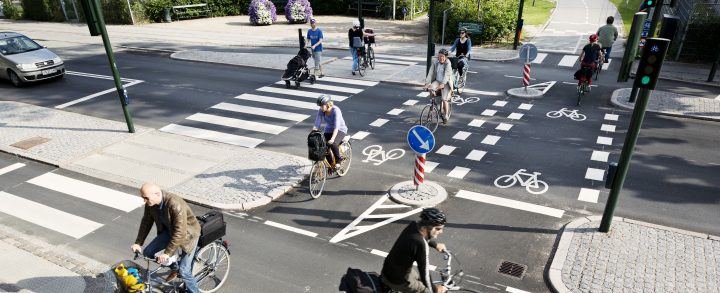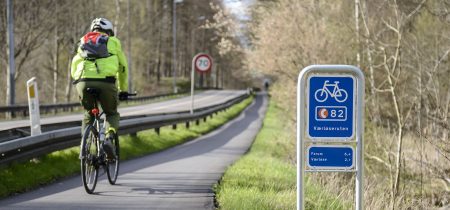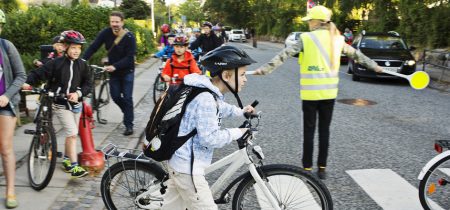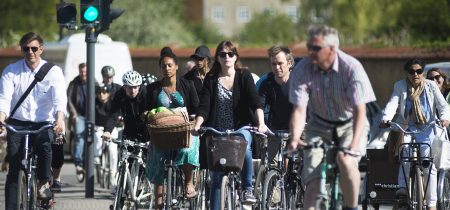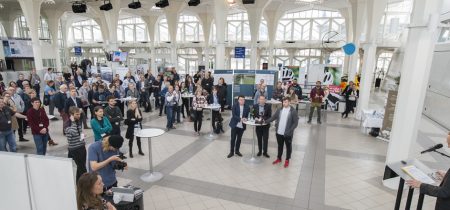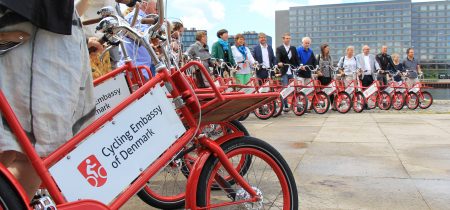The Municipal Cycling Council
Denmark’s development as a cycling country is primarily on the local level. Consequently, a close dialogue among key personnel across municipal borders is essential to achieve optimal solutions.
By Klaus Bondam, Danish Cyclists’ Federation
The Municipal Cycling Council (Det kommunale cykelfagråd) is a professional forum for a number of Danish local authorities that wish to actively promote cycling. In former times the local authorities rarely if ever cooperated on the planning level as they do today, but today the Cycling Council, and before that the Municipal Cycling Network (Det kommunale cykelnetværk) ensures cooperation.
The Cycling Council’s cooperative initiatives include:
- Mutual inspiration and exchange of ideas
- Experience sharing
- Seminars and workshops
- Consultation responses on government directives and bills
Good inter-municipal cooperation is vital for Denmark’s development as a cycling country because so much development is not centralized. This is primarily due to the fact that cycling infrastructure is usually established on local roads.
Consequently it is crucial that a forum exists to ensure that all the different initiatives and experiences from all over the country are collected and disseminated. If the individual authority works in isolation there is a great risk that valuable knowledge will get lost. Many local authorities have only one person to handle bicycle traffic, or even none, and are thus extremely vulnerable personnel changes. It is important that knowledge about bicycle traffic is available within the municipal system itself and not just from consultants.
26 local authorities were members of the network in 2018. The Danish Road Directorate is not a member, but often participates at the meetings anyway in order to keep abreast of local activities and provide information on relevant development. Non-members including researchers may also participate on special occasions.
The Cycling Council’s background
For many years the Danish state has supported municipal cycling projects to a greater or lesser extent through pooled funds. The state pools typically co-finance 40% of a given project while the local authority contributes 60%.
In the years prior to 1999 funding came from the former traffic pool. Even then beneficiaries were required to disseminate their results and experience to the other local authorities. The traffic pool was discontinued in 1999.
It was replaced by the Bike pool, which earmarked DKK 1 billion in state funds to cycling projects nation-wide. Project assessment and knowledge sharing were again factored in from the beginning.
The Danish Road Directory has published on-going assessments of a number of bike pool projects, also available in English. Today the Municipal Cycling Council aims to create a professional forum for local government workers to promote cycling.
The Cycling Council’s mode of operation
The Danish Cyclists’ Federation’s secretariat handles the Cycling Council’s secretariat function and among other things is in charge of drawing up agendas, sending out invitations and generally arranging all the practical details of the meetings.
The cooperative work within the Cycling Council is based on two annual meetings and on-going sparring. The local authorities that are members of the network take turns hosting the meetings. In addition to the two annual meetings there are also inter-municipal visits in connection with current projects
Agenda topics are decided on the previous meeting based on current needs. A few examples:
- Cooperation with business enterprises
- Bicycle parking
- Cyclist safety
A fixed item on the agenda is the participants’ status report on their current projects.
The Municipal Cycle Council used to publish the newsletter Cykelviden describing in detail a number of municipal projects in the years 2013-2017. The website is no longer active.
Today information on the Municipal Cycling Council’s work can be found on www.cykeltrafikken.dk


